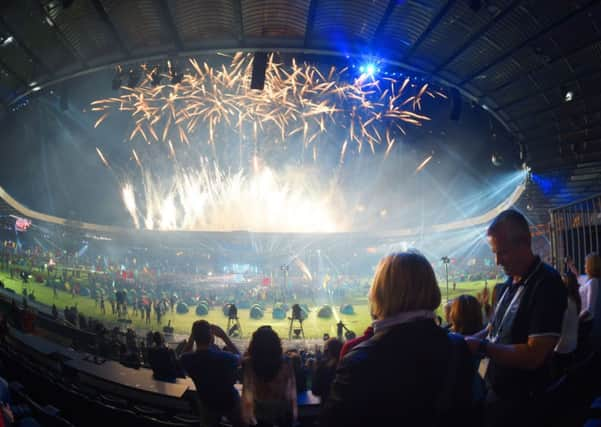James Willstrop: First-day impressions of Glasgow 2014 will leave a lasting memory


I walked in to Scotstoun, the venue for the tabletennis and squash, for the first day, the round of 64.
Glancing into the main arena to see the previous matches I was hit by walls of applause. The arena was nearing capacity, and capacity was 2,500.
And it was 12.30 on a Thursday afternoon.
Advertisement
Hide AdAdvertisement
Hide AdSquash events do well for crowds all over the world, but some finals of major events at weekends don’t pull 2,000 through the gate, let alone a weekday lunchtime. It was clear we were dealing with a different kind of event.
Alan Clyne, Scotland’s number one, was the player they were cheering, and I considered that the crowd might leave afterwards, but not the case; rather they had come to see the squash, and to immerse themselves in sport. The people turned up in droves for the 11 days.
They were magnificent, cheering their Scottish players on fervently but also welcoming every other nation with spine-tingling acclaim. It was a privilege walking in to that every day.
Some people had said England could expect jeering in Glasgow but it was always the opposite, never more so than when we and every other nation walked in to Celtic Park for the Opening ceremony.
Advertisement
Hide AdAdvertisement
Hide AdIt was a smaller stadium but yet more intimate than Delhi and Melbourne and the place was on fire. Add Rod Stewart to the mix and what can possibly go wrong.
Another startling moment came on the morning of the quarter-finals when I walked on to the practice court with Chris Simpson to a crowd of 300 cheering us on.
The Athlete Village is a quirky, make-believe kingdom that will hold many of our Commonwealth memories. It housed and fed the 4,500 athletes for the duration, and kept them interested and occupied away from their competition.
On site were cabins where laundry was done in no time, two food halls, a gym, a pharmacy, a belief centre (no I wasn’t sure either), an International Zone with cafés, bars and a hair salon. If Playstation or pool was your thing, there were dedicated zones.
Advertisement
Hide AdAdvertisement
Hide AdTransport was perfection and running the logistics of all operations were armies of helpful and pleasant volunteers, who did a fabulous job, as was apparently the case in London.
On returning, it was strange to see the world was still turning and we had a warm reaction.
Lots had seen the squash on television or read about it in the papers and everyone was thrilled we purportedly attracted one million viewers, but honestly I’m still irked we were a whole six million behind Bake-Off.
The medals have gone down well with people back home and I love it that second and third is deemed a success. I was congratulated on winning a silver, not losing a gold.
Advertisement
Hide AdAdvertisement
Hide AdThis is not the case in most other squash events around the world– a runner up is often disappointed.
But in Glasgow, you could see clearly how athletes were thrilled to just be there at all, regardless of medals. Quite rightly so.
The Commonwealth Games has had its critics.
Some like to call it a poor man’s Olympics as if to say no other sporting event on earth should exist.
Some countries not involved find it absurd that everyone in the Commonwealth takes it so seriously, and are understandably questioning at why the British try to remind everyone about their Empire.
Advertisement
Hide AdAdvertisement
Hide AdSome Americans don’t understand how an event can be so important without them, and have slagged the Games off, albeit with humour.
After all this though, what matters is that lots of people had fun watching and playing sport.
As long as that happened then people can say what they like.